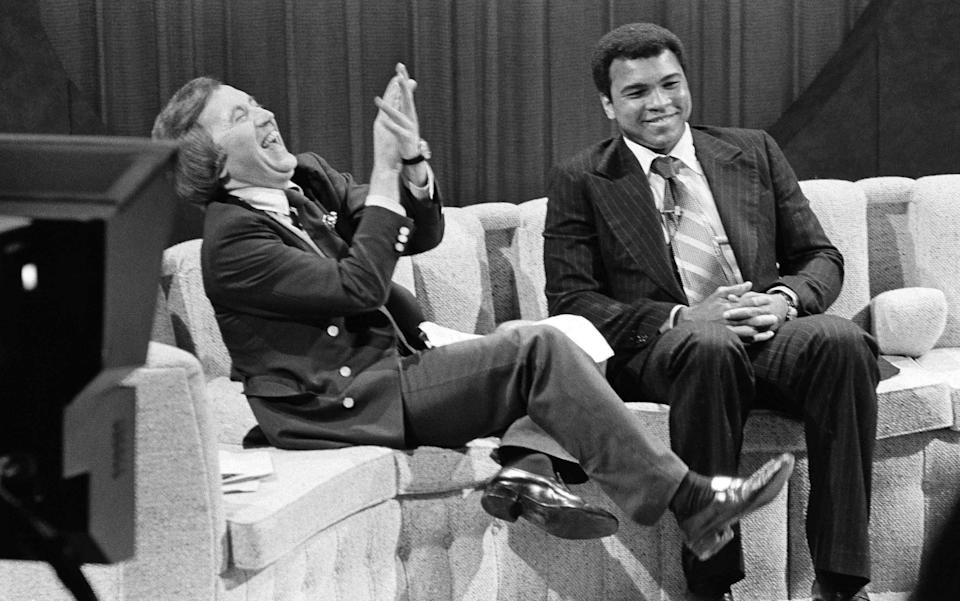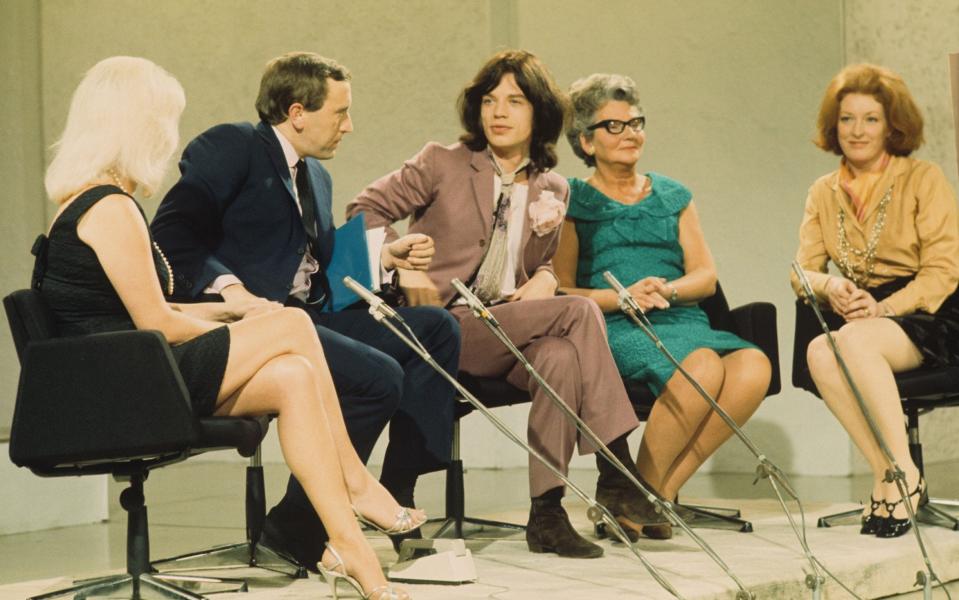What made David Frost king of the talk show?

“I would just like to let the people know about this man: he is one of the finest human beings that I’ve ever known in my life. He happens to be true grit, man. He is down, he is together in every sense of the word.”
Whose praises could Sammy Davis Jr be singing in front of a studio audience? Whose profound humanity could he be hymning? Frank Sinatra, maybe, or Dean Martin? But no, it’s not a Rat Packer. The recipient of such blush-making acclaim from one of the great entertainers of the age was a talk show host. And it happened on his own show too. “If you carry on I shall cry,” said David Frost. “Let me change the subject. Thank you, thank you very much.”
Imagine Madonna saying something similar in any of her encounters with Jonathan Ross. Or Meryl Streep bigging up Graham Norton. It’s unthinkable.
Frost is back, again. He died in 2013 but, away from his regular job as a news anchor, his son Wilfred has once more been busy rummaging for lost tapes of interviews his father conducted. A first series of The Frost Tapes in 2020 revisited his encounters with US politicians. The second shifts the dial to explore his multiple conversations with great stars from Lauren Bacall via Muhammad Ali to the Beatles, who in various permutations Frost met 16 times.
What’s clear from these conversations is that Frost’s native skill – it was a subtle kind of superpower – was to get the most famous people in the world, without any form of contractual pre-negotiation, to spill their secrets as if no one else was listening. All it took was simple, open-ended questions. Take this exchange with Elizabeth Taylor, who in 1971 was persuaded to make her first ever television appearance on The David Frost Show. “What is the role of women in relation to men?” Frost asked her. “I like a man to be the dominating figure in my life,” she replied, “but I like also to be his equal. I don’t want somebody to boss me around. I don’t want somebody to tell me what to do if it’s just for the sake of telling me. Do you know what I mean, David?”

Frost seemed to know what all his interviewees meant. What was his secret? It was partly luck. Television had been through its birth pangs by the early 1960s and was ready to flex its muscles when Frost, recently graduated from Cambridge with a third in English, became the face of the satire boom as the presenter of That Was The Week That Was. He was by no means the most gifted performer in a show scripted by all the wits of the age, but he was personable and he was new.
Frost also profited from the relative innocence of the television age. Stars appearing on the box felt uninhibited. Back then there were no PRs telling Frost what he could and – if he wanted their client to say yes next time – couldn’t ask them. He was slicker and livelier than early rivals such as the syrupy Eamonn Andrews and the toothy Simon Dee. Michael Parkinson, whose own talk show began in 1971, once told me that “the best interviewers are people who fade into the background and let the other people do the work”. He continued to rate Frost as a master of this technique long after he was deemed by some to have grown bland as host of BBC One’s Breakfast with Frost on Sunday mornings from 1993.
At his peak, not everyone would have thought of Frost as fading into the background. The Frost Report and the weightier The Frost Programme were both launched in 1966. He was so ubiquitous that his Cambridge contemporary Peter Cook notoriously expressed regret at having saved him from drowning in an American swimming pool in the early 1960s. Cook dubbed him “the bubonic plagiarist”, while Kitty Muggeridge said he had “risen without trace”.
The quip implied that Frost was more pushy than talented. But his talent, aside from a supreme ease on camera, was to make his interviewees feel safe. Unlike many later practitioners, from David Letterman to James Corden, he never aspired to prove how clever or funny he was. He let them do the talking, and he listened to the answers.
By 1969, when he was still only 30, Frost became television’s first transatlantic superstar. For three years he flitted back and forth across the Atlantic hosting shows either side of the ocean. Across more than 750 editions of The David Frost Show he talked about guns with Charlton Heston, feminism with Gloria Steinem and Lucille Ball, Hitler with Albert Speer and Jesse Owens and race with Davis and Ali.

His conversations with Ali – there were 10 over more than 30 years – were different in style from Michael Parkinson’s better-remembered confrontations, which even Parkinson recalled as “not interviews so much as events”. In 1968 Frost got chapter and verse on Ali’s refusal to be drafted to fight in Vietnam.
To measure the scope and scale of Frost’s career in television is practically a job for a palaeontologist, because his type of broadcaster is now extinct. The closest anyone has since come in the UK was Clive James, who briefly in the early 1990s presented a light entertainment show on BBC One on Saturdays and a serious talk show on BBC Two on Sundays, prompting one reviewer to dub him television’s first split personality. In truth that was Frost, who in the mid-1970s could comfortably switch between asking Richard Nixon about Watergate and Elton John about his wardrobe.
The more Frost lured his guests back, the more they grew to know and trust him. Among the serial interviewees featured in The Frost Tapes, some became genuine friends. Andrew Lloyd Webber and Michael Caine evidently felt they could spill the beans with someone they uncorked bottles with.
That level of trust has been emulated, up to a point, by Graham Norton, whose sofa is Hollywood’s go-to pitstop on British television. But the megastars sit there knowing that they will never be asked anything truly probing. It’s inconceivable that Norton would extract the same level of blistering honesty out of, say, Jessica Chastain that Frost got from Jane Fonda as she campaigned against war in Vietnam at the height of her fame.

The other advantage Frost had was space and time nowadays denied to TV hosts. The roomy interview has migrated to the podcast, where the likes of Elizabeth Day, Louis Theroux and David Morrissey persuade fellow celebrities to let their guard down in long-form, free-range conversations. The Frost Tapes in turn look at home on all the usual podcast outlets.
Frost’s longest conversation of all was with Nixon, lasting nearly 29 hours. The story of that defining moment in the history of television was dramatised in Peter Morgan’s play Frost/Nixon, which became an Oscar-nominated Hollywood film. In 2006 for the Telegraph I went to interview the interviewer at his office in west London and found him glad to revisit his greatest triumph, while also pointing out how the play departed from reality. What is striking now is Frost’s hunch that all those apparently soft celebrity interviews had given the Nixon camp a false sense of security.
“I think it’s very possible that they had only seen my talk show in New York,” he told me, “which actually had more content in it than other talk shows but nevertheless was a talk show. I think it’s very possible that they had not been aware of the journalism I’d already done here. They may have thought it would be gentle.”
Instead they got true grit, man.
The Frost Tapes starts on Radio 4 tomorrow at 11.30am

 Yahoo News
Yahoo News 